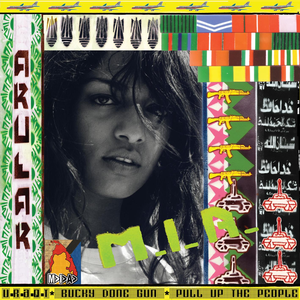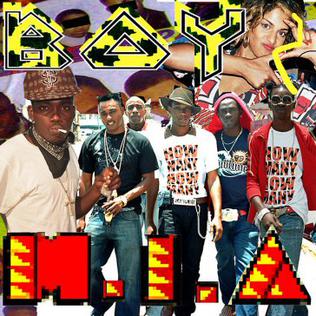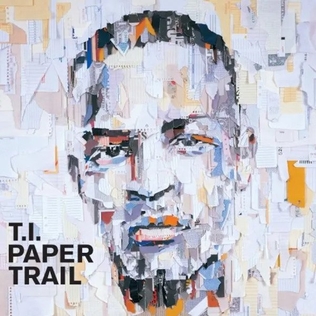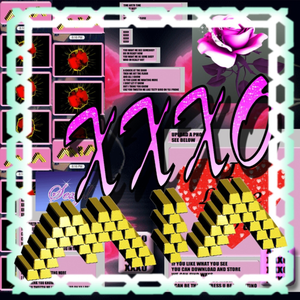
Arular is the debut studio album by British recording artist M.I.A. It was released on 22 March 2005 in the United States, and one month later in the United Kingdom, with a slightly different track listing. In 2004, the album's release was preceded by two singles and a mixtape. M.I.A. wrote or co-wrote all the songs on the album, while collaborators included Justine Frischmann, Switch, Diplo, Richard X, Ant Whiting and Greg "Wizard" Fleming.

Thomas Wesley Pentz, known professionally as Diplo, is an American DJ and music producer. He is a co-creator and lead member of the electronic dancehall music project Major Lazer; a member of the supergroup LSD, with Labrinth and Sia; a member of electronic duo Jack Ü, with producer and DJ Skrillex; and a member of Silk City, with Mark Ronson. He founded the record company Mad Decent in 2006, as well as the non-profit organization Heaps Decent the following year. His 2013 extended play (EP), Revolution, debuted at number 68 on the US Billboard 200. The EP's title track was later featured in a commercial for Hyundai and is featured on the WWE 2K16 soundtrack.

"Galang" is the debut single by British musician M.I.A. from her debut album Arular. It was released in 2003 on Showbiz Records which pressed 500 vinyl copies, gaining immediate international recognition via radio airplay, fashion shows, club rotations and internet filesharing. "Galang" was re-released on 1 November 2004 via XL Recordings as the second single from the album released by the label and was released for a third time as "Galang '05" on 11 October 2005 by the label and in the US by Interscope Records. It is written by Maya "M.I.A." Arulpragasam, Justine Frischmann, Ross Orton and Steve Mackey. It first appeared on M.I.A.'s six song demo tape in 2003, then on her official Myspace account on 9 June 2004 and was later reworked slightly by Orton and Mackey who received production credit for the song. "Galang" was the second song M.I.A. wrote on her Roland MC-505, intending for the piece to be performed by Frischmann's band Elastica. Inspired by her experiences and observations of life in London, M.I.A. wrote the song to encourage her friends in the band to continue to make music. However, after cowriting the song, Frischmann convinced M.I.A. to record "Galang" herself, complimenting the piece's lyrical narrative and music direction.

Aliaune Damala Bouga Time Puru Nacka Lu Lu Lu Badara Akon Thiam, known mononymously as Akon, is a Senegalese-American singer-songwriter, record producer, businessman, and philanthropist. An influential figure in world music, he rose to prominence in 2004 following the release of his debut single "Locked Up". Styled in hip hop, it preceded the release of his debut studio album Trouble (2004), which became his commercial breakthrough and spawned the R&B-styled follow-up, "Lonely" the following year.

Kala is the second studio album by British recording artist M.I.A. It was released on 8 August 2007 through XL Recordings. M.I.A. named the album after her mother and has stated that her mother's struggles in life are a major theme of the album. It was mainly written and produced by M.I.A. and Switch, and features contributions from Timbaland, Diplo, Afrikan Boy and The Wilcannia Mob.

"Boyz" is a song recorded by artist M.I.A. for her second album Kala (2007). The song was written and produced by Maya "M.I.A." Arulpragasam and Dave "Switch" Taylor and composed in recording sessions held in several countries. A combination of the native styles and influences of these regions and her traditional and electronic musical roots, the song sees M.I.A. mock and simultaneously praise men for various character traits. "Boyz" was one of the first songs that the artist composed for the album and was released as the album's lead single through XL Recordings and Interscope Records on 11 June 2007, in 12-inch single, CD single, digital download and USB flash drive formats. It additionally appeared in an enhanced EP format for its CD single release, and appeared on the How Many Votes Fix Mix EP edition. On 24 April 2007, "Boyz" received its world premiere on the BBC Radio 1 radio station in London.

"Jimmy" is a song recorded by British artist M.I.A. for her second studio album, Kala (2007). The song was written by Maya "M.I.A." Arulpragasam, Dave "Switch" Taylor and Bappi Lahiri and produced by Switch and M.I.A..

British rapper and singer M.I.A. has released six studio albums, two extended plays, three mixtapes, forty singles and twenty-nine music videos. Born Mathangi "Maya" Arulpragasam, M.I.A. began her career as a visual artist and film-maker, and moved into making music after filming a documentary on the band Elastica in 2001. The band's lead singer, Justine Frischmann, lent her a Roland MC-505 sequencer/drum machine which she used to make a demo tape that secured her a contract with British label XL Recordings.

Paper Trail is the sixth studio album by American rapper T.I., released September 30, 2008, on Grand Hustle Records and Atlantic Records. He began to write songs for the album as he awaited trial for federal weapons and possession charges. Unlike his past albums, he wrote his lyrics down on paper, which he had not done since his debut album, I'm Serious (2001).

Ryeisha Berrain, known by her stage name Rye Rye, is an American rapper, singer, dancer and actress. Signed to N.E.E.T. Recordings, she released her first mixtape RYEot PowRR in 2011 and her anticipated debut album Go! Pop! Bang! on May 15, 2012. In early 2009, MSNBC listed Rye Rye as one of the "5Top: Top of the pops! Up-and coming young singers." In 2011, Rye Rye was named one of Billboard's "21 Under 21". Rye Rye made her acting debut in the 2012 film 21 Jump Street.

The Kala Tour is a 2007 global M.I.A. concert tour performed in support of her studio album Kala.

"Swagga Like Us" is a song by American rappers Jay-Z and T.I. featuring fellow American rappers Lil Wayne and Kanye West, the latter of whom also produced the song, constructed primarily around a vocal sample of "Paper Planes" by British musician M.I.A. It was released on September 6, 2008, in the United States as the fifth single from T.I.'s sixth album Paper Trail (2008). The track was also initially slated for inclusion on Jay-Z's eleventh album The Blueprint 3 (2009), however it ultimately failed to make the final track listing.

Mathangi "Maya" Arulpragasam, known professionally as M.I.A., is a British rapper, record producer, and singer. Her music combines elements of alternative, dance, electronic, hip hop and world music with electronic instruments and samples.

"Born Free" is a song by English Tamil recording artist M.I.A., released alongside an accompanying short film/music video of the same name from her third album, Maya. XL Recordings and Interscope Records/N.E.E.T. released "Born Free" as a digital download from the album on 23 April 2010, with the music video released on 26 April 2010. "Born Free" was written and produced by Maya "M.I.A." Arulpragasam and Dave "Switch" Taylor. The artwork for the single was released on 25 April 2010.

"XXXO" is a song by English recording artist M.I.A., released as the lead single from her third studio album, Maya (2010). The song was written by M.I.A., Charles "Blaqstarr" Smith and Cherry Byron-Withers, and produced by Blaqstarr and Rusko. "XXXO" was first released as a digital download following its world premiere on radio on 10 May 2010, and released in physical format in the United Kingdom on 28 June 2010. Two XXXO remix EPs were released alongside the single, featuring Jay-Z, SBTRKT, KickRaux amongst others on official remixes. The song's release followed the digital release of "Born Free", also from Maya.

Maya is the third studio album by British recording artist M.I.A. It was released on 7 July 2010 through N.E.E.T. Recordings, XL and Interscope. Songwriting and production was primarily handled by M.I.A., Blaqstarr and Rusko. Producers Diplo and Switch, alongside M.I.A.'s brother Sugu, also worked on the album. Maya was mainly composed and recorded at M.I.A.'s house in Los Angeles. The album's tracks centre on the theme of information politics and are intended to evoke what M.I.A. called a "digital ruckus"; elements of industrial music were incorporated into M.I.A.'s sound for the first time upon its release. A deluxe edition was released simultaneously, featuring four new tracks.

"Bad Girls" is a song by British recording artist M.I.A. from her fourth studio album Matangi (2013). The song was written by Maya "M.I.A." Arulpragasam, Marcella Araica and Floyd Nathaniel "Danja" Hills, and produced by Danja. The song was M.I.A's first release following her departure from the UK's XL Recordings in 2011, and was released through Interscope Records in the US on 31 January 2012. A shorter version of the song appeared on Vicki Leekx, a mixtape released for free online on 31 December 2010. "Bad Girls" was released as a digital download a day after its world premiere on radio and online.

"Borders" is a song by recording artist M.I.A. for her fifth studio album, AIM (2016). The track was written by M.I.A., Levi Lennox and Amish Patel, and has been described as an electronic song incorporating such musical styles as hip hop and world music.

AIM is the fifth studio album by British rapper and singer M.I.A. It was released on 9 September 2016 by Interscope and Polydor Records. Prior to its release, M.I.A. claimed that it would be her final album. She worked on the composition and production of the album with a range of collaborators, including Blaqstarr, Diplo, and Skrillex. The album was recorded in various countries, including Jamaica and India, and includes vocal contributions from Dexta Daps and Zayn. As with M.I.A.'s earlier releases, the album mixes Eastern and Western musical influences. Lyrically, several tracks on the album contain themes of borders and refugees.

Mata is the sixth studio album by English recording artist M.I.A. It was released on 14 October 2022 through Island Records, marking her first album release for six years. M.I.A. worked with a number of producers on the album, including Skrillex and long-time collaborator Diplo, and recorded tracks in various locations around the world. As with M.I.A.'s earlier releases, the album mixes Eastern and Western musical influences, with styles such as moombahton and bhangra incorporated into the music. Mata received generally positive reviews from music critics but, unlike her previous albums, it did not enter the album charts in either the UK or US.

























